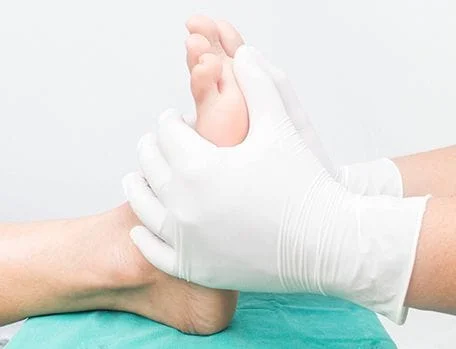
What is Charcot Foot?
Charcot foot is a progressive condition that causes the weakening of tissues, joints, and bones in the ankle or foot. It is sometimes also referred to as diabetic foot. Charcot foot occurs due to peripheral neuropathy, where damage to the nerves in your feet as a result of trauma or injury resulting in the inability to sense pain or the severity of injury in the feet.
As a result, injuries such as minor fractures can worsen over time as patients keep walking on their feet, causing further harm and, eventually, foot deformities. Patients who have diabetes are mostly prone to Charcot foot, especially those with type 1 diabetes.
What Are the Causes of Charcot Foot?
One of the main causes of Charcot foot is peripheral neuropathy or damage to the nerves in the foot or ankle. Charcot foot is more common in patients with diabetes; however, non-diabetic patients can also experience Charcot foot if they have had prior traumas to the feet that result in loss of sensitivity and feeling to the affected area.
There are two main types of Charcot foot that podiatrists diagnose patients with:
- acute Charcot foot — occurs as a result of trauma, such as a minor fracture, to the foot that isn't felt by the patient. Putting repeated weight on the foot by walking worsens the condition. Patients with acute Charcot foot may experience redness, swelling, and heat on their affected foot or ankle.
- chronic Charcot foot — this arises as a result of the body's inability to heal bones quickly. Patients with chronic foot usually end up with open sores that are more predisposed to getting infected.
What Are the Symptoms of Charcot Foot?
Early symptoms of Charcot foot include redness, swelling, and inflammation of the affected foot. Some patients may also experience warmth or heat from the foot, as well as minimal pain.
The longer Charcot foot goes untreated, the worse the symptoms become. Patients with undiagnosed Charcot foot may experience:
- bone fractures that worsen over time, leading to bone infections known as osteomyelitis
- ankle or foot joint dislocation
- deformed feet due to collapse of the arch in the middle of the foot. This is often referred to as a "rocker-bottom foot"
- foot sores
- infected ulcers, especially in the case of patients with diabetes
What to Expect During a Charcot Foot Diagnosis and Treatment Appointment
If you've never been diagnosed with Charcot foot, you might be wondering what to expect at your first diagnostic appointment. A trained healthcare professional such as a podiatric physician or a foot and ankle surgeon will begin by conducting a complete health history, including making a note of your diet, environment, and current lifestyle.
From there, your doctor may conduct a physical exam to observe any initial swelling or redness—beginning signs of Charcot foot. They may also request several imaging or lab tests to be conducted. These can include:
- blood tests
- bone scans
- foot x-rays
- MRIs
- nerve biopsies
- electromyographies
Depending on the severity of your symptoms, your podiatrist may recommend complete immobilization of the foot to decrease the onset of permanent foot deformities. This can include being fitted for a cast, using a wheelchair, or a walker. Other common forms of treatment recommended by podiatrists include:
- protective footwear such as orthotic insoles and braces to prevent re-injury
- changes to lifestyle, including a decrease in the amount of time spent on your feet
- surgery such as ostectomy (removal of bony prominences) and realignment osteotomy (to correct existing foot deformities—especially for patients with chronic Charcot foot
- amputation—in the case of infected ulcers or bone infection
Regular checkups of your feet for signs of cuts or redness, as well as prevention, change in lifestyle, and an early diagnosis by your podiatrist are some of the recommended ways to delay or prevent the onset of Charcot foot.
